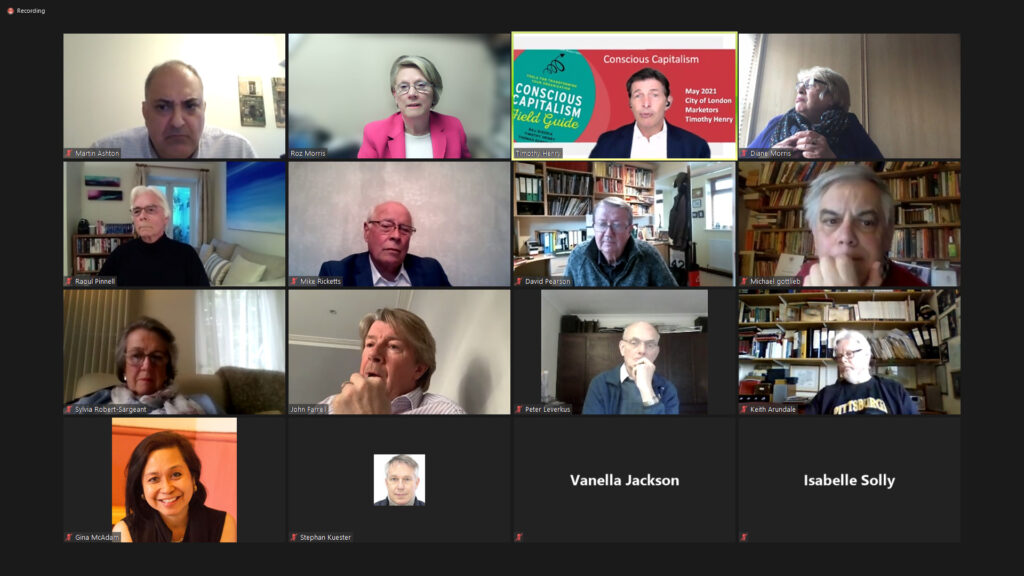By Roz Morris, Managing Director, TV News London
Capitalism has achieved a lot of good things in the past couple of centuries since the Industrial Revolution, but there have also been huge mistakes and abuses, so it needs to change to regain trust and to make the world a better place in the 21st century. That was the message from Timothy Henry, one of the founders of the Conscious Capitalism movement when he gave an online talk to the Worshipful Company of Marketors in May 2021 and was interviewed by Roz Morris, Managing Director of TV News London, and a Liveryman of the Marketors.
The Conscious Capitalism movement started in 2008 as the world was going through the financial crisis. Companies such as Whole Foods, Patagonia, Southwest Airline and Costco are prominent names among the first to take up this way of doing business and thousands of businesses have now followed their example.
Timothy is one of the co-authors of ‘The Conscious Capitalism Field Guide – Tools for Transforming Your Organisation’, published by Harvard Business Review Press in 2018, He has served as a trustee of the non-profit organisation, Conscious Capitalism Inc. for 12 years. He was co-CEO and Managing Partner of BRIDGE, a global consulting and leadership firm, with over 30 years of experience working as a trusted business advisor; from Fortune 20 to entrepreneurial, owner-managed businesses, across the globe. He’s a former Principal at Booz, Allen and Hamilton in New York and Tokyo and is the Chair of the Board for Syntrio Inc., a company focused on training for HR compliance and ethics issues. He is a Canadian who is a graduate of both Oxford University and the University of Southern California.
In his talk and PowerPoint presentation, Timothy explained that Conscious Capitalism is a philosophy that believes there are fundamental questions requiring new thinking for business people in the 21st century.

It is not enough to say ‘My business is here to make money’. We all need to ask ourselves: What is the purpose of our business? Conscious Capitalists believe there is nothing wrong with profits. However profitability alone is not enough. Business creates prosperity and enables progress, but marketing and business values have to be aligned and businesses have to emphasise ideas like trust, collaboration and compassion as central and everyday principles, not add-ons for marketing purposes.
This is not just an ideal, Timothy explained. Younger customers are already voting with their dollars and pounds, and buying from companies that state their purpose in terms of making the world better. Surveys show that Millennials are rejecting the idea that a company must maximize profit for its shareholders to the exclusion of everything else.
Meanwhile the current legal structures of capitalism, in the US and the UK especially, mean companies are frequently under attack from activist shareholders with short-term strategies that work only for their own benefit, not for companies and employees.
Conscious capitalism goes further than CSR (Corporate Social Responsibility) because it is a more comprehensive and holistic approach to the relationship between business and society. Conscious capitalism is rooted in a company’s philosophy, whereas CSR programs are often attached to traditional business models as separate entities.
The four guiding principles behind conscious capitalism are, a higher purpose, stakeholder orientation, conscious leadership and conscious culture and these principles go through the entire organisation from top to bottom. Conscious capitalists believe the flourishing of human beings is at the centre of business. This is a concept being worked on by some very large businesses, such as Unilever with its policy of combining purpose and profitability for its brands.
Timothy’s talk provoked plenty of questions from his very engaged online audience of Marketors. These included the issue of Whole Foods selling itself to Amazon, the growth of ESG (Environmental, Social, and Governance), and Investors increasingly applying these non-financial factors as part of their analysis process to identify material risks and growth opportunities. There was also debate about existing UK laws under the Companies Act 2006 already providing for directors to have a legal requirement to act in good faith to promote the success of the company for the benefit of its members as a whole i.e. employees, suppliers, customers and others, and how and whether this law is being applied.




